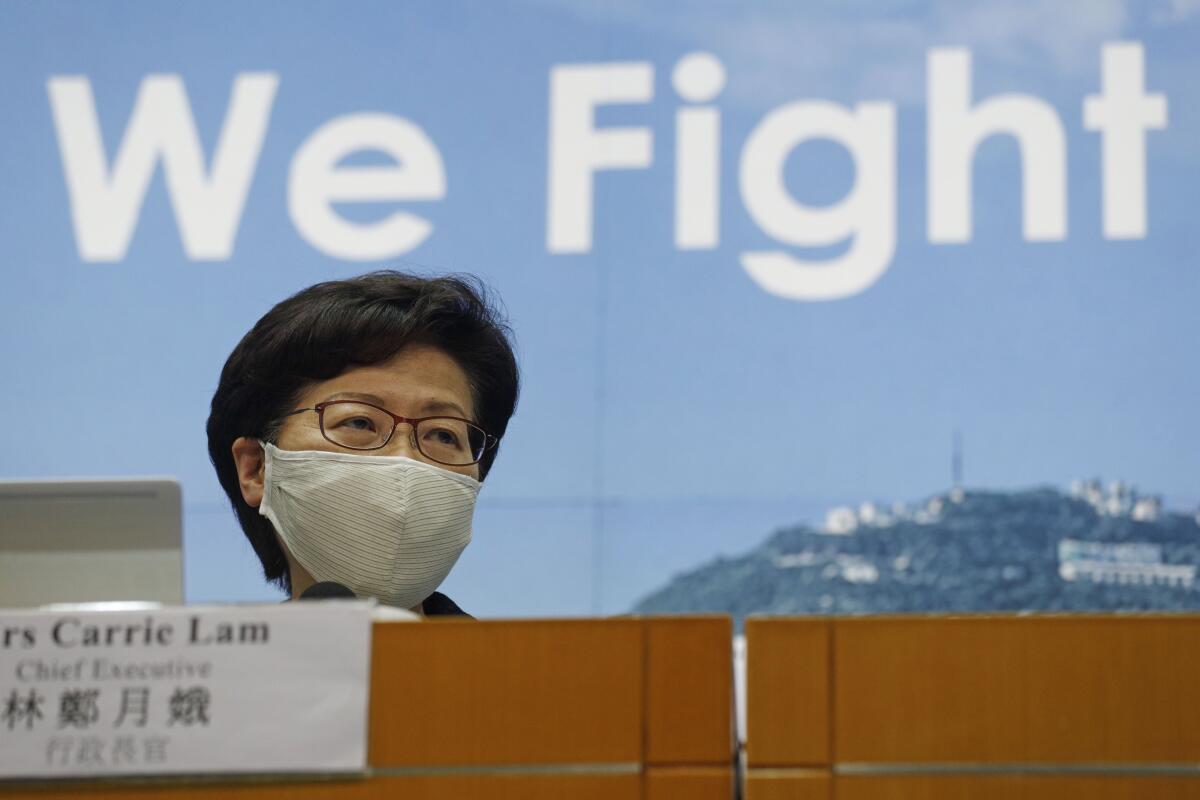Editorial: No to a U.S.-China cold war

The announcement Friday that Hong Kong’s legislative elections, originally scheduled for September, would be delayed a year because of the COVID-19 pandemic is the latest example of the increasing authoritarianism in China. It came weeks after Beijing adopted a new security law that ostensibly prohibits “secession, subversion, terrorism and collusion with foreign forces” but is in fact a pretext for stopping the waves of pro-democracy protests that have roiled the former British colony since 2014. Amid a cultural purge and increased censorship, the freedoms that China had pledged to uphold following the 1997 handover of the region from Britain have been seriously eroded.
It has been a terrible year for the cause of freedom in China. In June, an independent panel of United Nations experts denounced the crackdown in Hong Kong, including assaults on protesters; the continuing persecution of ethnic and religious minorities in Xinjiang and Tibet; the detention of lawyers; and the ongoing prosecution, even disappearance, of human rights activists.
Sadly, the debilitation of the United States on the world stage has left Washington poorly equipped to speak up for human rights and democracy. Worse, President Trump has shown little interest in such issues, and has instead deferred to an alarming degree to global strongmen.
Meanwhile, his administration has sought to dramatically change the U.S. approach to China. “If we want to have a free 21st century, and not the Chinese century of which Xi Jinping dreams, the old paradigm of blind engagement with China simply won’t get it done,” Secretary of State Michael R. Pompeo recently declared. “We must not continue it and we must not return to it.”
Although “blind engagement” is a caricature of previous U.S. policy, Pompeo has a point. After the normalization of Sino-American relations in 1979, the United States was largely supportive of China’s peaceful rise. A bipartisan consensus across six presidencies held that exchanges of goods, students and ideas would benefit both countries. The United States was crucial to China’s entry into the World Trade Organization in 2001, which helped open vast new markets for China’s colossal export industries.
That consensus has now frayed to the breaking point. Trump rose to power in part on his claims that China had taken advantage of the United States, stealing American jobs and technology. Hawks like Pompeo see the Obama administration, in particular, as having been naive and impotent in the face of increasing Chinese aggression, especially in geopolitical hot spots such as the South China Sea.
Trump’s complaints about China’s unfair trading practices — the theft and extraction of intellectual property, the subsidies for favored Chinese industries and the general disregard for international rules — were valid, as was his observation that previous administrations had failed to change China’s behavior. But his get-tough approach did little more than ratchet up tensions and costs on both sides of the Pacific.
If we’ve learned anything from the extended trade war with Beijing, it’s that the United States can’t bully China into the mainstream. It needs to assemble a broad coalition of countries behind a higher set of standards for exporters to operate under — including labor laws and environmental protections — making it harder for China to remain an outlier. And in the meantime, it needs to enforce more aggressively the trade rules China agreed to honor as a member of the WTO.
Trump, sadly, has gone in the opposite direction. Rather than building coalitions, he abandoned multilateral trade deals and antagonized other major exporting nations with tariffs. And he has sought to render the WTO toothless by blocking appointments to a key panel that judges trade disputes.
It’s a pattern repeated across multiple areas of interest regarding China. Trump’s chaotic leadership and his dictatorial leanings have severely eroded America’s standing in the world — damage that will take decades to repair.
The Thucydides Trap is a term that describes an apparent tendency toward war when a rising power threatens to displace an established one. The sad truth is that the authoritarians who lead the two nations — Xi, who took office in 2012, is all but certain to be president for life, and Trump, who in 2018 joked, “Maybe we’ll give that a shot someday” — have made the trap more likely to become a reality.
It would be a tragedy if hawkish and nationalist tendencies in Washington and Beijing intensified. The United States and China still have the potential to collaborate on global challenges — especially the climate crisis — and to promote peaceful global development. China’s rise does not require America’s decline.
But to once again lead on the world stage, the United States must first renew its own democracy. It must support democracies in Asia — including India, Indonesia, Japan, South Korea, Australia and Taiwan — while continuing to engage with China on trade and human rights. Engagement has often been frustrating and unproductive, but the alternative — bellicosity and a ratcheting up of tensions between the superpowers — is unthinkable.
More to Read
A cure for the common opinion
Get thought-provoking perspectives with our weekly newsletter.
You may occasionally receive promotional content from the Los Angeles Times.










